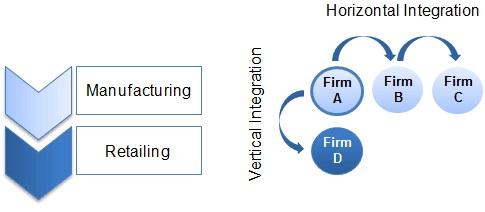- Business Concepts ›
- Human Resources (HR) ›
- Horizontal Integration
Horizontal Integration
Definition & Meaning
This article covers meaning & overview of Horizontal Integration from HRM perspective.
What is meant by Horizontal Integration?
Integration is a crucial for HR to increase the effectiveness and relevance of HRM in an organization. Horizontal integration refers to the integration of the various components of HR.
An HR system is referred to as a horizontally integrated system if it’s different components, like the system, the tools, the process etc. are in synchronization. This is vital for the effectiveness of HR in an organization.
For example: The HR functions like recruitment, policy formulation, building work culture etc. should be in sync, to make the HR department of the organization effective.
Horizontal integration refers to the acquisition of business companies which are working on the same level in the value chain by a company. On the other hand, vertical integration refers to the acquisition by a firm of business companies which are not working on the same level in the value chain but are working in the upstream or downstream activity in the value chain. The reasons and the strategy of the company decides whether to go for a horizontal integration or a vertical integration. By vertical integration the company spreads its activities across the value chain. It gives the advantage in sourcing of raw materials for the production (if it is upstream acquisition) or it helps in getting closer to the customers (if it is downstream acquisition). Horizontal integration helps in getting economies of scale as the same activity or the product is now manufactured at a large scale. This is mainly the step behind the Cost leadership strategy adopted by the company. The following figure aptly describes Horizontal and Vertical integration.

Horizontal Integration can be done by mergers or acquisitions of firms offering similar (if not same) products and/or services. Some of the examples of horizontal integration are as follows:
|
Acquiring Company |
Acquired Company |
Industry |
|
Porsche |
Volkswagen |
Automobile |
|
Kraft Foods |
Cadbury |
Food |
|
Pfizer |
Wyeth |
Pharmacy |
|
AT&T |
T-Mobile |
Telecom |
|
Oracle |
PeopleSoft |
Technology |
Some of the important advantages of Horizontal integration are as follows:
- Economies of Scale: By manufacturing more units of the same product
- Economies of Scope: By sharing resources and resulting synergies
- Increased Market Power: Over suppliers as well as retailers
- Reduction in cost of international trade: By operating in diverse countries
The main issue while following horizontal integration and acquiring companies is the issue of antitrust that may arise and the associated legal issues that a firm needs to go through before becoming successful in the integration process. Also, after acquiring of any firm, by any firm often has many other issues before they integrate as one company like various Organizational Behavior and culture related issues. And it takes a considerable amount of time before the benefits could be realized
Hence, this concludes the definition of Horizontal Integration along with its overview.
This article has been researched & authored by the Business Concepts Team which comprises of MBA students, management professionals, and industry experts. It has been reviewed & published by the MBA Skool Team. The content on MBA Skool has been created for educational & academic purpose only.
Browse the definition and meaning of more similar terms. The Management Dictionary covers over 1800 business concepts from 5 categories.
Continue Reading:
What is MBA Skool?About Us
MBA Skool is a Knowledge Resource for Management Students, Aspirants & Professionals.
Business Courses
Quizzes & Skills
Quizzes test your expertise in business and Skill tests evaluate your management traits
Related Content
All Business Sections
Write for Us